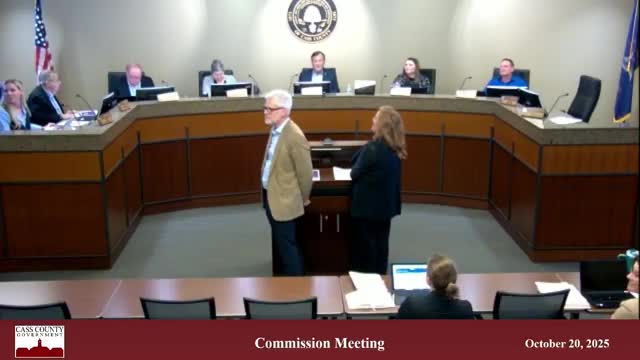Innovate 28 update: regional workforce gains but full goals remain years away, presenters say
Get AI-powered insights, summaries, and transcripts
Subscribe
Summary
Chamber and economic development leaders reported quarterly progress on Innovate 28, a public–private initiative funded at roughly $4 million a year, including workforce-concierge growth, talent-attraction rankings and development of a Center for Civic Engagement; commissioners pressed for clearer deliverables and budget guidance.
Leaders of the Fargo-Moorhead-West Fargo Chamber and the Economic Development Corporation presented the Cass County Commission with a quarter-3 progress report on Innovate 28, a multi-year public–private initiative designed to boost regional workforce, business development and public policy coordination.
Shannon Full, president of the chamber, and Joe Raso of the Economic Development Corporation said Innovate 28 is funded at just under $4 million per year and focuses on workforce, public policy, business development and economic impact. They reported several metrics and activities: the region’s Lightcast labor-market ranking put the metro around the 30th percentile for talent attraction after recent population growth; the initiative’s long-term goal is to increase the regional labor force by 12,000 over four years, with about 4,600 of that total added as of the latest (August) data. Presenters said the numbers fluctuate seasonally.
Full and Raso highlighted several program elements: an expanded “concierge” service that provides customized tours and onboarding support to prospective recruits (24 of 35 concierge tours completed in the quarter), an “icebreaker” cadre of roughly 40 community champions to help recruiting and retention, curriculum development tied to the Career Innovation Center, and an expanded young professionals summit that drew 143 participants.
Raso emphasized business-development activity: the region maintains a pipeline of more than three dozen projects, ongoing outreach to data center and ag-tech prospects, and a document-ready site program that prepares properties for potential investors. Presenters named Applied Digital as a major regional project and said other potential AI and data center developers remain under discussion.
On public policy, Innovate 28 staff reported roundtables with federal and state legislators and a soft launch of a new Center for Civic Engagement that aims to improve civic participation and candidate cultivation through employer-led toolkits and a founding circle of corporate partners. Full said the center’s founding dinner included 45 CEOs and organizational leaders and had already produced interest from potential local candidates.
Commissioners asked for clearer, written deliverables tied to the county’s appropriation, citing questions about how county funds are used and what the county can point to when asked by constituents. Commissioner Flacknell specifically asked for documented goals, metrics and budget-side rails; commissioners and presenters said budget numbers and program guidelines appear in the county’s budget packet and the initiative’s supporting materials. Full and Raso said the advisory board reviews progress and that different investors may prioritize different pillars (workforce, business development, policy).
Earlier in the meeting, Full and Raso invited commissioners to an investor briefing scheduled for the following day and described ongoing efforts to measure economic impact, including tracking new tax base growth and property-tax implications of large projects.
The presentation was informational; commissioners requested follow-up materials including the budget guidance and program goals that accompany the county’s investment.
